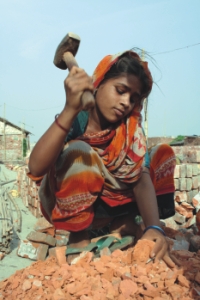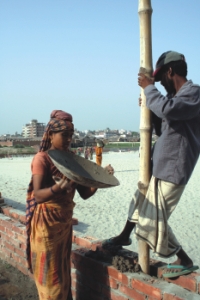|
Reflections
The Prince of Peshawar
On Hope and Hard Labour
Stine Haynes
 On a map, Bangladesh is torn to pieces by rivers. They creep up from the south until they tear at the heart of Dhaka. To midtown traffic, rivers don't reach and no steady flow carries the crowds outside my window. That they move at all defies the laws of logic, a true challenge to our infrastructured European minds. Perhaps 'challenge' is in fact the word that best captures my experiences here in Bangladesh. Challenging not because things are more nor less difficult than other places but because they are different, always new. Every sight is a challenge because it is new and thus refuses to attach itself to prior experiences. I know not what to expect from this trip. I know that a steamer will take us from Dhaka to Khulna, but Khulna means nothing to me and I have never before travelled the rivers. On a map, Bangladesh is torn to pieces by rivers. They creep up from the south until they tear at the heart of Dhaka. To midtown traffic, rivers don't reach and no steady flow carries the crowds outside my window. That they move at all defies the laws of logic, a true challenge to our infrastructured European minds. Perhaps 'challenge' is in fact the word that best captures my experiences here in Bangladesh. Challenging not because things are more nor less difficult than other places but because they are different, always new. Every sight is a challenge because it is new and thus refuses to attach itself to prior experiences. I know not what to expect from this trip. I know that a steamer will take us from Dhaka to Khulna, but Khulna means nothing to me and I have never before travelled the rivers.
A river is hard to imagine from here in the heart of Dhaka. One street just leads to another and a web of minor roads carry me past the many lives that call Dhaka their home. People appear as from out of nowhere and to nowhere they escape. I keep skipping between images, skipping quickly to the next but always going back to the one before, afraid to turn my head for what my eyes might miss on the other side. I place my hand on the window, between my index finger and my thumb I trap more images than my mind can capture, and as the van moves just an inch, I lose them all again. Individualism vanishes before my eyes and it doesn't make me sad although I feel that it somehow should. It makes me feel the exact opposite of lonely. I don't know if there is a word for that.
Bangladesh possesses its own kind of beauty, impossible to describe but always present. It hides in the contrasts of wall cracks, green fields and rickshaw backs. It appears on faces with traces of stories unknown to me and it lies in the uncompromising eyes of a stranger no longer so strange. Beauty is here too, by the grand river bank. Here rests the steamer that will take us to Khulna, elegant despite its size and gracefully awaiting its passengers. Nevertheless, it is the crowds that steal the picture. Always the crowds. Our cameras focus nowhere else and thus the crowd is always growing, bursting with curiosity and wonder.
'Sister, sister which country?' Denmark. Ah, Denmark -- it could be anywhere. They ask us what we are doing here, as though it is hard to imagine a purpose. All our explanations fall short. Instead we look for common ground, search for something that is the same. We always find something. I remember Amina's persistant eyes, look: I have no mother, no father. She shrugs her shoulders that's just the way it is. I have sister, one brother. You have sister, apa? Yes, I nod, I have a sister too. She smiles and smiles, satisfied that we have something in common. Brother? Yes. I even have a brother. She laughs, it's almost too good to be true.
Experiences settle like dust. First they penetrate all, make you cough and sneeze and itch. You scratch your eyes but it only gets worse and you can't see clearly anymore. Finally it settles like a gentle thin layer on everything. Brushing it away, it comes back. It always comes back. It's in the air. Even out here on the deck.
Darkness has fallen but is not yet black. From the darkness come shadowy shapes that we leave behind in a firm crawl forward. Little lights linger on the surface, indicating, perhaps, fishing nets?
As first class passengers, we enjoy luxuries quite unknown to our fellow passengers. I have never seen such distinctions before and I don't know what to make of them. A curious boy, from the decks below, sneeks a peak and is brushed away with an angry hand. The body of the angry hand sends me an apologetic smile. No apology accepted, I quite liked the boy to be here. I will never get used to the sticks either, try as they might to keep the kids at a safe distance. But I don't think I have ever felt more safe than here in the crowds. I have never felt the need to watch out for either my life or my purse. I sense no one would touch it. And yet what's in it could change a life.
A song rises from below. It seems to capture everything within reach. The song so naturally finds what I have been searching for in vain: a way to communicate the green riverbanks that float away, to touch and make tangible a world of floating illusions. I lean across the railing to see, but nothing is to be seen. There is just this song without a body, a tune with lyrics in foreign tongues and yet it speaks of what I cannot. In Bangladesh people sing. Suddenly and just because. I wish there were more singing where I come from. I wish there were more reasons to sing.
 In the evening we arrive in Khulna and immediately continue on bumpy roads to the village of Bhatsalla. We wake up in a world of green. Whereas in Dhaka there are few smiles, here we find an abundancy of smiles and laughter. They smile. I say something. They laugh. Millions of exchanges like this one take place. We are welcome everywhere. A woman points towards her house, I nod: so this is your house. She points at me and then at the house again. No, not now, I shake my head, maybe later. What's the gesture for 'maybe later'? I make a desperate gesture. She laughs. Donyobad, I whisper. She smiles: for what? Thank you. Thank you for everything. For including me in this world of green. In the evening we arrive in Khulna and immediately continue on bumpy roads to the village of Bhatsalla. We wake up in a world of green. Whereas in Dhaka there are few smiles, here we find an abundancy of smiles and laughter. They smile. I say something. They laugh. Millions of exchanges like this one take place. We are welcome everywhere. A woman points towards her house, I nod: so this is your house. She points at me and then at the house again. No, not now, I shake my head, maybe later. What's the gesture for 'maybe later'? I make a desperate gesture. She laughs. Donyobad, I whisper. She smiles: for what? Thank you. Thank you for everything. For including me in this world of green.
Green afternoons, an old woman prepares a mat for us to sit on. Her face traces a different reality, her hands black and hard run smoothly through my strange hair. We laugh. Around us mostly women and like women we chat. Are we married? Why not? Are we religious? Why not? Have we forgotten to brush our hair? They brush it. The conversations are clumsy but their questions not strange. And tell me, if strangers are not strange, are they strangers still? We leave with a national flower that we must put in 'pani' and a 'gamla' made of coconut. We leave with great hope because it is not needed to understand each other to meet with mutual respect and curiosity.
Geographically, Bangladesh is in the midst of natural calamaties. Rivers always threaten to rise and wash it away and from the north, man flushes fellow man. Yet Bangladesh is not sinking. It proudly floats on hope and hard labour.
Stine Haynes works with Mati Productions, a Bangladesh-Denmark joint venture cultural exchange team.
Copyright
(R) thedailystar.net 2006 |
